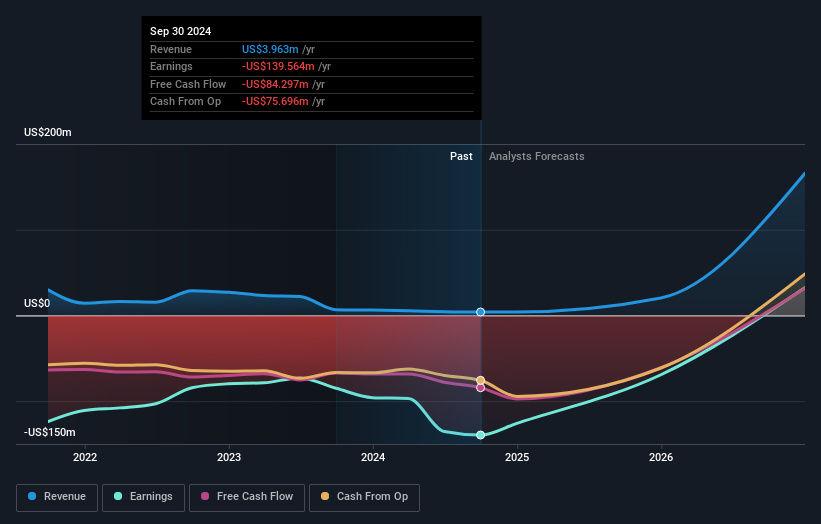- United States
- /
- Biotech
- /
- NasdaqGS:PGEN
Further weakness as Precigen (NASDAQ:PGEN) drops 16% this week, taking five-year losses to 89%

We're definitely into long term investing, but some companies are simply bad investments over any time frame. We don't wish catastrophic capital loss on anyone. Imagine if you held Precigen, Inc. (NASDAQ:PGEN) for half a decade as the share price tanked 89%. And we doubt long term believers are the only worried holders, since the stock price has declined 41% over the last twelve months. Furthermore, it's down 32% in about a quarter. That's not much fun for holders. We really feel for shareholders in this scenario. It's a good reminder of the importance of diversification, and it's worth keeping in mind there's more to life than money, anyway.
If the past week is anything to go by, investor sentiment for Precigen isn't positive, so let's see if there's a mismatch between fundamentals and the share price.
Check out our latest analysis for Precigen
Precigen wasn't profitable in the last twelve months, it is unlikely we'll see a strong correlation between its share price and its earnings per share (EPS). Arguably revenue is our next best option. Shareholders of unprofitable companies usually desire strong revenue growth. As you can imagine, fast revenue growth, when maintained, often leads to fast profit growth.
In the last five years Precigen saw its revenue shrink by 52% per year. That's definitely a weaker result than most pre-profit companies report. So it's not that strange that the share price dropped 14% per year in that period. This kind of price performance makes us very wary, especially when combined with falling revenue. Of course, the poor performance could mean the market has been too severe selling down. That can happen.
You can see below how earnings and revenue have changed over time (discover the exact values by clicking on the image).

This free interactive report on Precigen's balance sheet strength is a great place to start, if you want to investigate the stock further.
A Different Perspective
While the broader market gained around 29% in the last year, Precigen shareholders lost 41%. Even the share prices of good stocks drop sometimes, but we want to see improvements in the fundamental metrics of a business, before getting too interested. Unfortunately, last year's performance may indicate unresolved challenges, given that it was worse than the annualised loss of 14% over the last half decade. Generally speaking long term share price weakness can be a bad sign, though contrarian investors might want to research the stock in hope of a turnaround. It's always interesting to track share price performance over the longer term. But to understand Precigen better, we need to consider many other factors. Consider for instance, the ever-present spectre of investment risk. We've identified 3 warning signs with Precigen (at least 1 which makes us a bit uncomfortable) , and understanding them should be part of your investment process.
We will like Precigen better if we see some big insider buys. While we wait, check out this free list of undervalued stocks (mostly small caps) with considerable, recent, insider buying.
Please note, the market returns quoted in this article reflect the market weighted average returns of stocks that currently trade on American exchanges.
New: Manage All Your Stock Portfolios in One Place
We've created the ultimate portfolio companion for stock investors, and it's free.
• Connect an unlimited number of Portfolios and see your total in one currency
• Be alerted to new Warning Signs or Risks via email or mobile
• Track the Fair Value of your stocks
Have feedback on this article? Concerned about the content? Get in touch with us directly. Alternatively, email editorial-team (at) simplywallst.com.
This article by Simply Wall St is general in nature. We provide commentary based on historical data and analyst forecasts only using an unbiased methodology and our articles are not intended to be financial advice. It does not constitute a recommendation to buy or sell any stock, and does not take account of your objectives, or your financial situation. We aim to bring you long-term focused analysis driven by fundamental data. Note that our analysis may not factor in the latest price-sensitive company announcements or qualitative material. Simply Wall St has no position in any stocks mentioned.
About NasdaqGS:PGEN
Precigen
Operates as a discovery and clinical-stage biopharmaceutical company that develops gene and cell therapies using precision technology to target diseases in therapeutic areas of immuno-oncology, autoimmune disorders, and infectious diseases.
High growth potential with adequate balance sheet.


